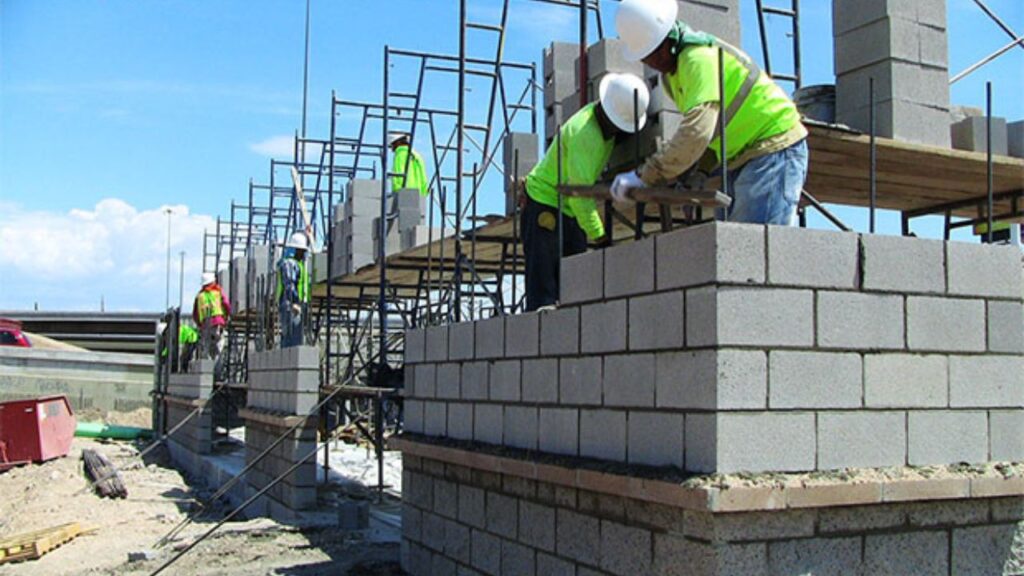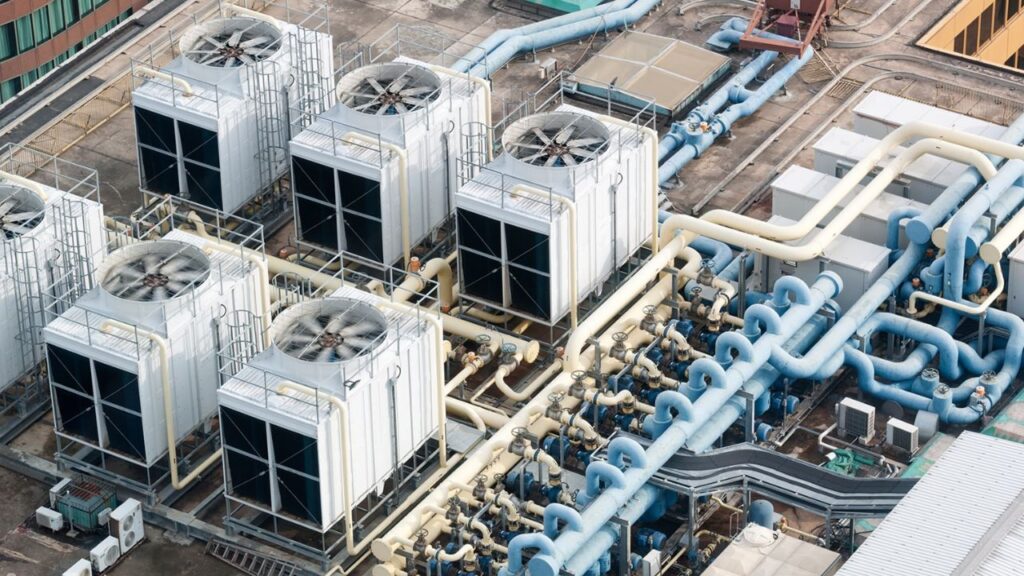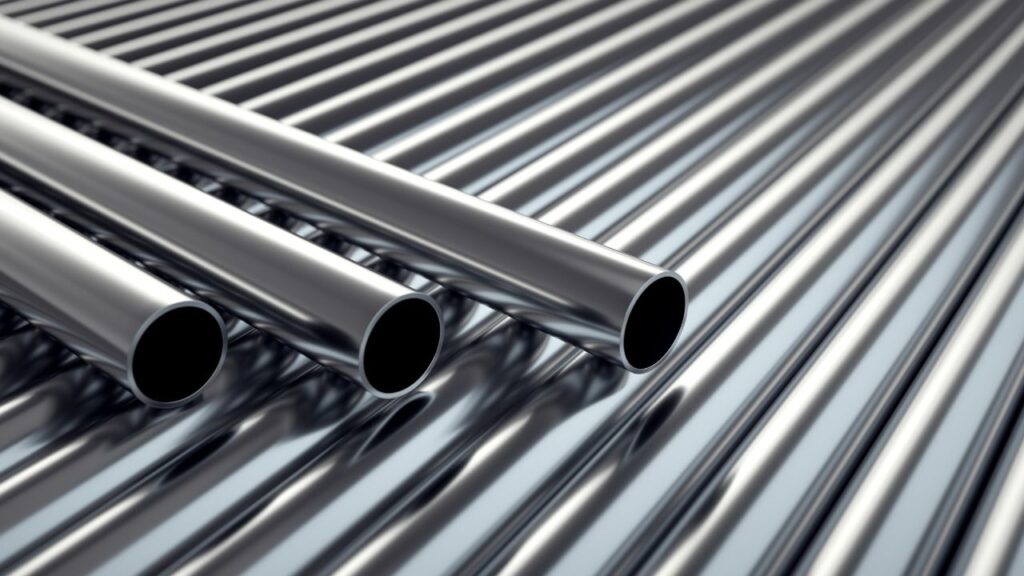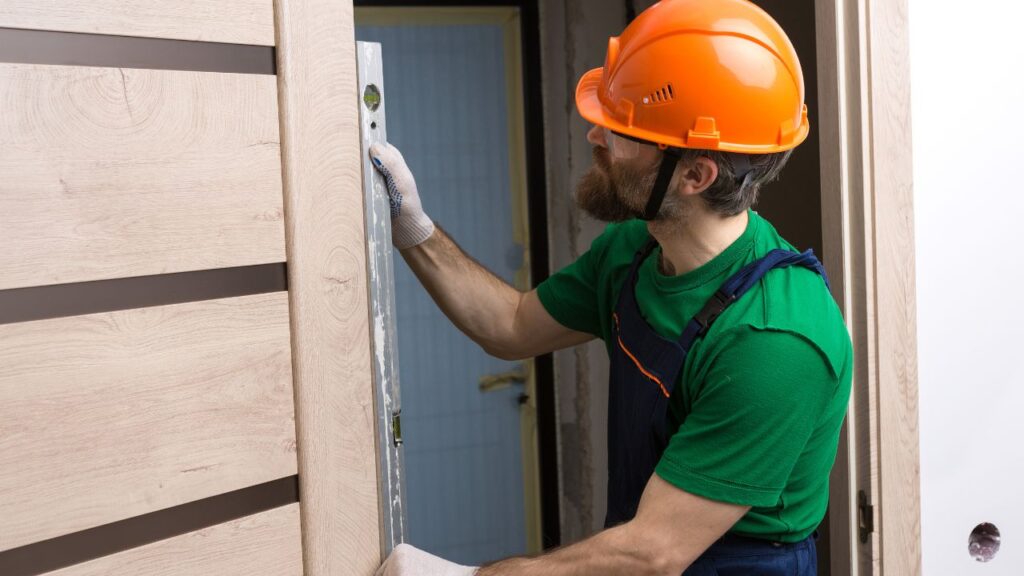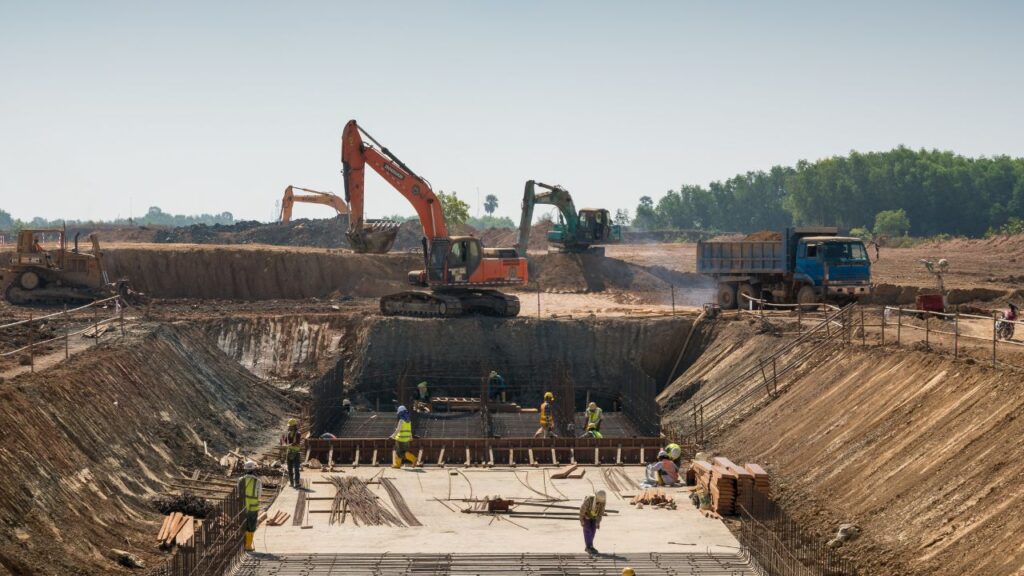Metal roofs are a durable and stylish option that can range from $4 to $48 per square foot installed or $400 to $4,800 per roofing square. The total installation cost for a metal roof typically falls between $8,160 and $40,800, depending on the type of metal used and the size of the roof.
Professional contractors use roofing squares (equal to 100 square feet) to calculate material needs and costs. Metal roofing materials are typically sold in pre-measured sheets, about 50–100 square feet each. It’s standard practice to order about 10% more material than needed to account for waste and potential issues during installation.
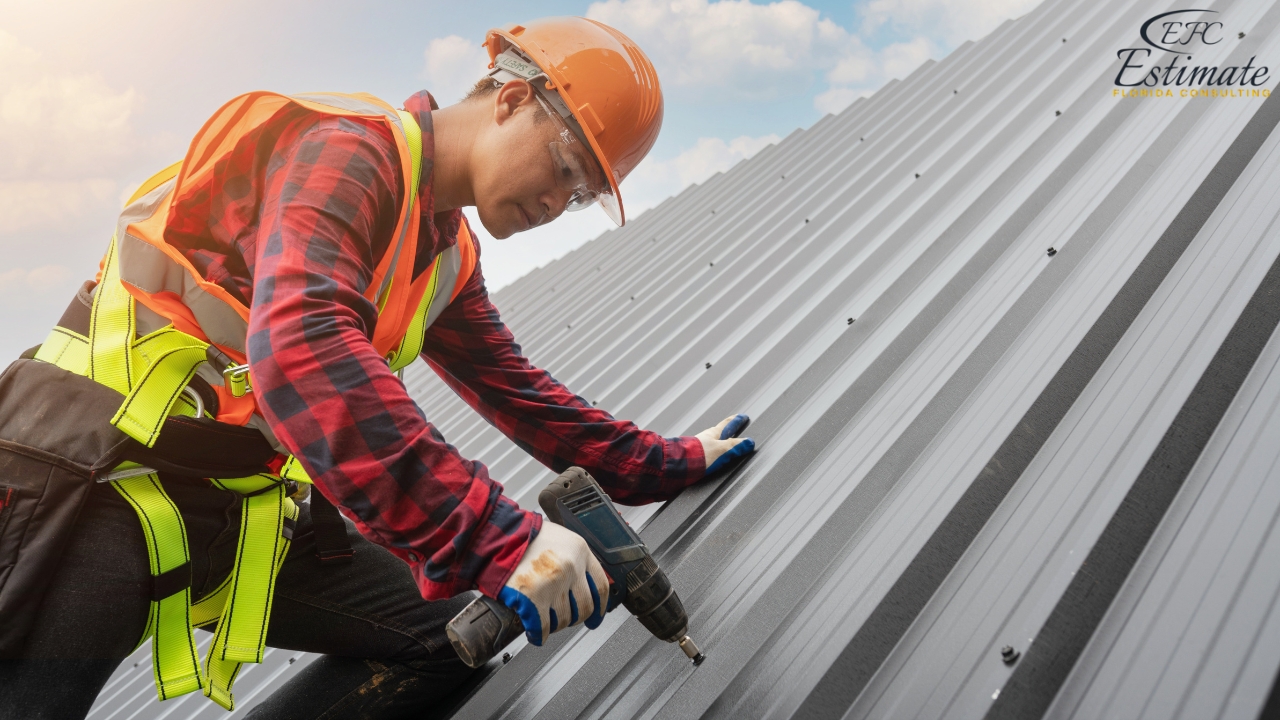
Material | Average Price Per Sq. Ft. (Installed) | Price Per Sheet | Price for 1,700 Sq. Ft. |
Galvalume Steel | $4–$10 | $400–$1,000 | $8,160–$17,850 |
Galvanized Steel | $5.40–$20.40 | $540–$2,040 | $9,180–$34,680 |
Aluminum | $7.80–$25.20 | $780–$2,520 | $13,260–$42,840 |
Stainless Steel | $8.40–$24 | $840–$2,400 | $13,860–$40,800 |
Tin (Terne) | $12–$31.20 | $1,200–$3,120 | $20,400–$53,040 |
Zinc | $17.40–$25.20 | $1,740–$2,520 | $29,580–$42,840 |
Copper | $24–$48 | $2,400–$4,800 | $40,800–$81,600 |
How Much Does Metal Roofing Cost by Roof Size?
The size of your roof plays a significant role in determining the total cost of a metal roofing project. Metal roofing installation typically costs between $4.80 and $48 per square foot, depending on factors such as the material, style, and labor. Below is a breakdown of pricing based on common roof sizes:
Roof Size (Square Feet) | Cost Range |
1,000 | $4,800 – $48,000 |
1,250 | $6,000 – $60,000 |
1,500 | $7,200 – $72,000 |
2,000 | $9,600 – $96,000 |
2,500 | $12,000 – $120,000 |
How Does Metal Roofing Compare to Other Roofing Materials?
Metal roofing is a popular upgrade from traditional asphalt shingles due to its superior durability, long lifespan, and energy efficiency. While metal roofs have a higher upfront cost, they are a mid-range option compared to other premium materials like slate or solar roofing. One key advantage is that metal roofing can last significantly longer than asphalt shingles, making it a cost-effective choice over time.
When selecting a roofing material, two critical factors to consider are the total cost (including installation) and the expected lifespan of the material. Below is a comparison of metal roofing with other common roofing materials.
Material | Total Cost | Cost per Square Foot | Life Span (Years) |
Metal | $18,360–$29,784 | $10.80–$17.52 | 40–70 |
Asphalt Shingles | $8,670–$16,830 | $5.10–$9.90 | 20–30 |
Built-up Roofing (BUR) | $6,960–$9,996 | $4.10–$5.88 | 15–30 |
Clay Tiles | $12,036–$29,940 | $7.08–$17.62 | 50–100 |
Concrete | $10,524–$17,544 | $6.19–$10.32 | 50 |
Green Roofing | $20,400–$57,120 | $12–$33.60 | 40 |
Slate | $15,420–$38,148 | $9.07–$22.44 | 75–200 |
Solar Roofing | $32,844–$42,540 | $19.32–$25.02 | 25–30 |
Wood Shingles | $13,320–$20,196 | $7.83–$11.88 | 15–30 |
How Do the Different Types of Metal Roofing Compare?
Metal roofing offers a range of materials to suit different needs, from durability to aesthetic appeal. The best type of metal roofing depends on your location, budget, and preferences. Common options include steel, aluminum, tin, zinc, and copper, each with unique benefits and cost ranges.
Steel Shingles
Steel roofing is one of the most versatile and durable options, with several subtypes available:
- Galvanized Steel: Coated with zinc to resist corrosion. Costs range from $5.40 to $20.40 per square foot installed, with a total cost for 1,700 square feet between $9,180 and $34,680.
- Galvalume Steel: Features an aluminum coating for corrosion resistance. This option costs $480 to $1,080 per 100 square feet and installs for $8,160 to $18,360.
- Stainless Steel: The most high-end steel option, offering exceptional durability and a polished finish. Installed costs range from $8.40 to $24 per square foot, with total costs for a 1,700-square-foot roof between $14,280 and $40,800.
Aluminum Roofing
Aluminum is ideal for coastal regions due to its corrosion resistance against saltwater. Installed costs range from $7.80 to $25.20 per square foot, making it a more affordable yet durable choice. However, aluminum can dent easily and may require frequent maintenance due to expansion and contraction caused by temperature changes.
Tin Roofing Panels
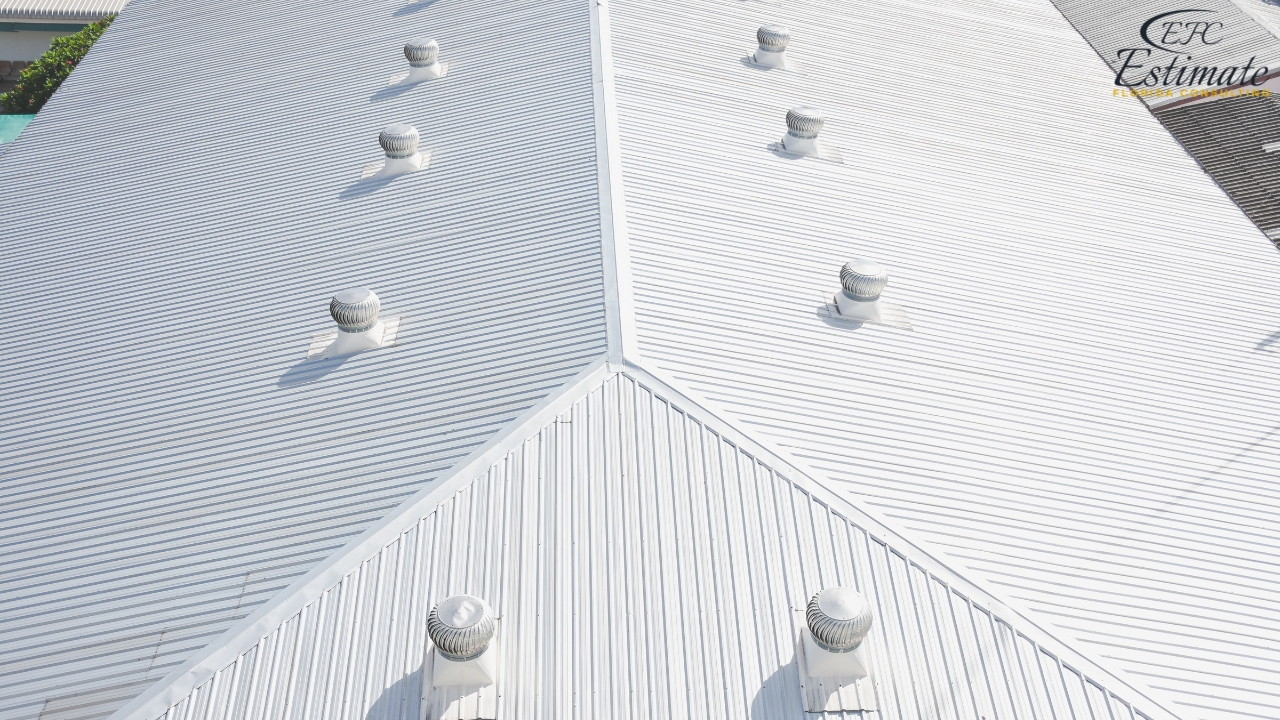
Tin roofing, once popular in the 19th century, is now less common but still valued for its durability and charm. Modern “tin roofs” typically use terne, a steel core with a tin alloy coating, providing excellent corrosion resistance. Installed costs range from $12 to $31.20 per square foot, totaling approximately $20,400 to $53,040 for a 1,700-square-foot roof.
Zinc Roofing Panels
Zinc roofing is known for its long lifespan—up to 100 years—and its self-healing properties, which allow it to repair scratches and maintain its appearance. Zinc panels cost $7.20 to $12 per square foot installed, offering a balance between affordability and performance.
Copper Roofing Tiles
Copper roofing is one of the most luxurious and durable metal roofing options. It is lightweight, visually striking, and capable of developing a unique patina over time. Copper roofs are expensive, with installed costs ranging from $24 to $48 per square foot, resulting in a total cost of $40,800 to $81,600 for a 1,700-square-foot roof.
Benefits of Metal Roofing
Metal roofing has gained popularity for its unmatched durability, longevity, and energy efficiency. Offering a sleek appearance and low maintenance requirements, metal roofs are ideal for homeowners looking to invest in long-term solutions that enhance their home’s value and reduce energy costs. Available in a wide range of colors, styles, and materials, metal roofing can complement any architectural design.
Longevity and Durability
One of the most significant advantages of metal roofing is its exceptional lifespan. According to the Metal Roofing Alliance’s 2022 Residential Metal Roofing Buyer’s Guide, metal roofs can last 50 years or more, far outlasting traditional roofing materials like asphalt, which typically last only 15–20 years.
Metal roofing is also highly resistant to extreme weather conditions, including hail, high winds, and heavy storms. It’s fire-resistant and less susceptible to smoke damage, making it a preferred choice for areas prone to wildfires. While metal roofs can dent under significant impact, such as golf-ball-sized hail, they remain far more durable than asphalt shingles, which can tear or sustain damage under much less force.
Ease of Cleaning
Cleaning a metal roof is a straightforward process compared to other roofing materials. A simple pressure washing is usually sufficient to maintain its appearance, whereas traditional roofs often require specialized cleaning methods and chemicals. This ease of maintenance saves homeowners both time and money.
Energy Efficiency
Metal roofs are highly energy-efficient due to their reflective surface, which deflects sunlight and reduces heat absorption. As John Foley, New England branch manager of Long Home Products, explains, “Reflection of sunlight will lower surface temperatures on a roof and subsequently reduce attic temperatures, lowering energy costs.”
Special paints and coatings can further enhance metal roofing’s energy efficiency by blocking ultraviolet (UV) rays. According to the MRA, metal roofs can cut energy bills by up to 30%, making them an excellent long-term investment in reducing heating and cooling costs.
Eco-Friendliness
Metal roofs are one of the most sustainable roofing options available. They are often made from 30%–60% recycled materials and are 100% recyclable at the end of their lifespan, unlike many traditional roofing materials that end up in landfills. Their resistance to fungus and moss eliminates the need for chemical treatments, further reducing their environmental impact. The durability of metal roofs also means fewer replacements, reducing waste and resource consumption over time.
Increased Resale Value
A new metal roof not only enhances curb appeal but also boosts home resale value. According to Remodeling Magazine’s 2023 Cost vs. Value Report, homeowners can expect to recoup about 61.2% of their investment in a metal roof when selling their property. This high return on investment makes metal roofing an attractive option for those looking to add value to their homes.
Customization and Enhanced Aesthetic
Metal roofing offers a wide range of customization options, from paint colors to finishes and styles. Aluminum and steel roofs provide the most extensive color selections, while materials like copper, zinc, and tin have natural textures and finishes that create a distinctive look.
Win More Projects With Us
What Are the Disadvantages of Metal Roofing?
While metal roofing offers several distinct advantages, there are also some notable drawbacks to consider before making a decision.
Cost
The upfront cost is often the biggest deterrent for homeowners considering a metal roof. Metal roofing materials and professional installation typically cost more than other roofing options like asphalt shingles. For those on a tight budget, this higher initial expense may push them toward more affordable alternatives. However, metal roofs are known for their exceptional durability and longevity, which can offset the initial investment over time through reduced maintenance and replacement costs.
Difficulty of Installation
Metal roofing installation is more complex than other roofing types, posing a challenge for homeowners who prefer a DIY approach. Proper installation requires specialized tools, advanced skills, and knowledge to ensure the roof is secure, weatherproof, and long-lasting. Without professional expertise, errors in installation could lead to performance issues and increased costs for repairs. For this reason, hiring experienced roofing contractors is often necessary, adding to the overall cost.
Factors That Influence the Cost of Metal Roofs
Several factors contribute to the total cost of installing a metal roof, including labor, location, roof pitch, underlayment, style, trim, finishes, and gutter requirements. Below, we break down each cost factor in detail to help you better understand what impacts the final price.
Labor
Labor accounts for about two-thirds of the total cost of a new metal roof. This includes specialized tools and safety equipment needed for installation. Labor costs typically start at $420–$480 per sheet (covering approximately 100 square feet). Complex roof designs or steep pitches can further increase labor costs due to the additional time and expertise required.
Location
Your geographic location significantly influences metal roofing costs. Areas with a higher cost of living generally have higher labor and material costs. Additionally, local weather conditions play a role in material selection. For instance, in regions prone to heavy winds or hail, more durable materials may be necessary, increasing the overall expense.
Roof Pitch
Roof pitch refers to the steepness of the roof and is expressed as a ratio, such as 3:12 or 6:12. Pitches steeper than 6:12 are considered hazardous and require extra safety measures, leading to higher installation costs. Steeper roofs also require more precise labor, increasing the overall price.
Underlayment
Underlayment is an essential component that protects your roof deck from leaks. If your existing underlayment isn’t compatible with metal roofing, a new layer will need to be installed. Costs for synthetic underlayment range from $0.18 to $0.78 per square foot, depending on the material and quality.
Style
Corrugated Metal Panels
Corrugated metal roofs are a cost-effective and easy-to-install option, recognizable by their wave-like patterns. However, they are less durable and may be prone to leaks if not installed correctly. These panels cost $4.80 to $7.20 per square foot, with total installation for a 1,700-square-foot roof ranging from $10,094 to $14,404.
Standing Seam Panels
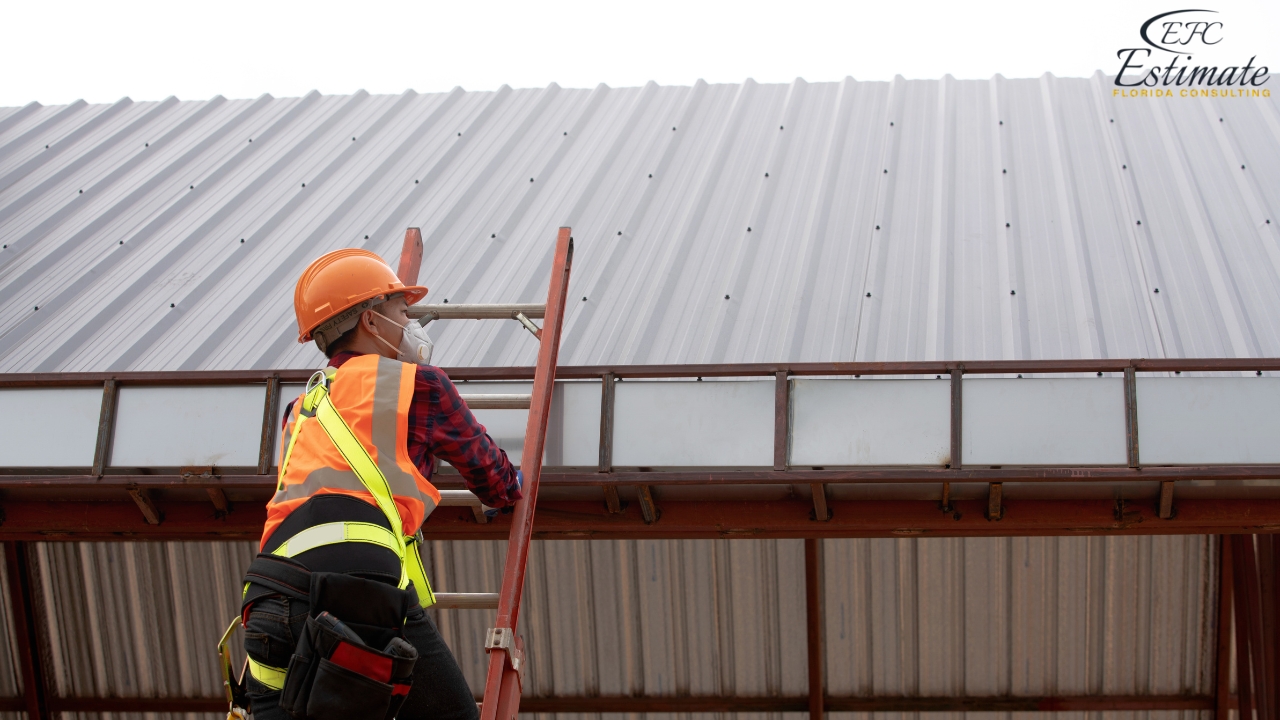
Standing seam panels are a premium option, featuring concealed fasteners that improve durability and aesthetics. Materials like aluminum, steel, copper, and zinc cost $8.40 to $15.60 per square foot, with total installation for a similar-sized roof ranging from $14,280 to $26,520. While aluminum and steel are more affordable, copper and zinc provide unmatched longevity and weather resistance.
Trim and Flashing
Trim and flashing are necessary for protecting roof edges and joints. Costs vary based on the type of metal roofing system.
Trim Type | Cost Per Linear Foot |
Exposed Fastener Eave Trim | $3.00–$4.80 |
Exposed Fastener Gable Trim | $3.00–$4.80 |
Exposed Fastener Ridge Cap | $4.20–$6.00 |
Standing Seam Eave Trim | $6.60–$9.60 |
Standing Seam Gable Trim | $6.60–$9.60 |
Standing Seam Ridge Cap | $8.40–$12.00 |
Finishes
Metal roof finishes improve durability and color retention.
- Polyvinylidene Fluoride (PVDF): Premium finish with excellent resistance to fading and weathering. Costs 15%–35% more than other finishes but is prone to scratches.
- Silicone-Modified Polyester (SMP): Harder and more scratch-resistant but susceptible to UV cracking and fading.
Gutters
New roof installations often require updating the gutter system for optimal performance. Gutter replacement or repair costs range from $1,200 to $8,400, averaging $12 per linear foot. Adding gutter guards for extra protection can further increase costs but improves longevity and performance.
Common Myths About Metal Roofs
Myth 1: You Can’t Install Metal Roofing Over an Old Roof
Contrary to popular belief, you can install a metal roof over an existing asphalt shingle roof, though it’s generally not recommended. This approach is often used to save money but can lead to issues if the underlying roof has damage. Before proceeding, it’s essential to have a professional roofing contractor inspect the existing roof for any structural problems. If the roof is in poor condition, it’s better to remove it before installing the metal roof to ensure long-term durability.
Myth 2: Metal Roofs Affect Cellphone Reception
Metal roofs do not interfere with cellphone reception. A weak cellphone signal is more likely due to factors such as the distance from a utility tower, weather conditions, or the quality of your service provider. The misconception that metal roofs block signals is unfounded.
Myth 3: Metal Roofs Are Loud When It Rains
Another common myth is that metal roofs are excessively noisy during rainfall. In reality, a properly installed metal roof with underlayment is no louder than any other type of roof. Modern installation techniques significantly reduce noise, making this concern largely a misconception.
How Can You Save Money on a Metal Roof?
Find Discounts
Always inquire about discounts when purchasing a metal roof. Sales representatives may not automatically include discounts in your quote unless you ask. For instance, many roofing companies offer senior discounts or seasonal promotions that could significantly lower your total cost.
Negotiate
Don’t hesitate to negotiate with your roofing contractor. Many companies are open to discussions about pricing and terms. For example, some homeowners have successfully reduced costs by agreeing to payment plans or allowing their homes to be photographed for promotional purposes. Negotiation can lead to unexpected savings.
Download Template For Roofing Project Breakdown
- Materials list updated to the zip code
- Fast delivery
- Data base of general contractors and sub-contractors
- Local estimators

Are Metal Roofs Worth the Cost?
Metal roofs are a popular choice for homeowners in both extreme heat and cold climates due to their unique benefits. In hotter regions, metal roofs reflect sunlight and minimize heat retention, keeping homes cooler. In colder areas, their enhanced durability makes them ideal for withstanding heavy snowfall.
While metal roofs are more expensive upfront compared to other materials, they are a long-term investment. Their durability, energy efficiency, and reduced maintenance costs make them cost-effective over time. Additionally, metal roofs are resistant to weather damage, helping homeowners avoid frequent repairs and replacements. With proper installation and care, a metal roof can provide decades of reliable performance and increase property value.
Question Answer
Frequently Asked Question
Metal roofs are a stylish and durable option, with installation costs ranging between $4 to $48 per square foot or $400 to $4,800 per roofing square. The total cost typically falls between $8,160 and $40,800, depending on the type of metal and roof size. Professional contractors often use roofing squares (100 square feet) to calculate material needs, ordering 10% more to account for waste and potential installation issues.
Material | Price Per Sq. Ft. | Price Per Sheet | Price for 1,700 Sq. Ft. |
Galvalume Steel | $4–$10 | $400–$1,000 | $8,160–$17,850 |
Galvanized Steel | $5.40–$20.40 | $540–$2,040 | $9,180–$34,680 |
Aluminum | $7.80–$25.20 | $780–$2,520 | $13,260–$42,840 |
Stainless Steel | $8.40–$24 | $840–$2,400 | $13,860–$40,800 |
Tin (Terne) | $12–$31.20 | $1,200–$3,120 | $20,400–$53,040 |
Zinc | $17.40–$25.20 | $1,740–$2,520 | $29,580–$42,840 |
Copper | $24–$48 | $2,400–$4,800 | $40,800–$81,600 |
Roof size directly influences installation costs. Here’s an estimate for common roof sizes:
Roof Size (Square Feet) | Cost Range |
1,000 | $4,800 – $48,000 |
1,250 | $6,000 – $60,000 |
1,500 | $7,200 – $72,000 |
2,000 | $9,600 – $96,000 |
2,500 | $12,000 – $120,000 |
Metal roofs are pricier upfront but offer superior durability, longevity, and energy efficiency, making them cost-effective over time. Here's a comparison with other common materials:
Material | Total Cost | Cost per Sq. Ft. | Life Span (Years) |
Metal | $18,360–$29,784 | $10.80–$17.52 | 40–70 |
Asphalt Shingles | $8,670–$16,830 | $5.10–$9.90 | 20–30 |
Slate | $15,420–$38,148 | $9.07–$22.44 | 75–200 |
Solar Roofing | $32,844–$42,540 | $19.32–$25.02 | 25–30 |
- Longevity: Lasts 50+ years compared to asphalt shingles' 20–30 years.
- Durability: Resistant to extreme weather, fire, and impact.
- Energy Efficiency: Reflects sunlight, reducing cooling costs by up to 30%.
- Eco-Friendliness: Made from recyclable materials, reducing landfill waste.
- Resale Value: Boosts home value, with a return on investment of up to 61.2%.
- High Initial Cost: Metal roofs cost more upfront compared to other materials.
- Complex Installation: Requires professional expertise, increasing labor costs.
- Steel Roofing: Versatile and durable, available in galvanized, galvalume, and stainless steel.
- Aluminum: Ideal for coastal areas, resistant to corrosion but prone to dents.
- Tin (Terne): Offers vintage charm and corrosion resistance.
- Zinc: Long lifespan with self-healing properties.
- Copper: Luxurious with a unique patina, but highly expensive.
- Look for Discounts: Many companies offer seasonal or senior discounts.
- Negotiate: Discuss pricing and terms with contractors for potential savings.
Yes, metal roofs are a long-term investment. Their durability, energy efficiency, and minimal maintenance make them an excellent choice for homeowners seeking cost-effective, sustainable solutions.
Comprehensive Trade-Specific Estimates
At Estimate Florida Consulting, we offer detailed cost estimates across all major trades, ensuring no part of your project is overlooked. From the foundation to the finishing touches, our trade-specific estimates provide you with a complete and accurate breakdown of costs for any type of construction project.

Testimonials
What Our Clients Say
We take pride in delivering accurate, timely, and reliable estimates that help contractors and builders win more projects. Our clients consistently praise our attention to detail, fast turnaround times, and the positive impact our estimates have on their businesses.
Estimate Florida Consulting has helped us win more bids with their fast and accurate estimates. We trust them for every project!

Steps to Follow
Our Simple Process to Get Your Estimate
01
Upload Plans
Submit your project plans, blueprints, or relevant documents through our online form or via email.
02
Receive Quotation
We’ll review your project details and send you a quote based on your scope and requirements.
03
Confirmation
Confirm the details and finalize any adjustments to ensure the estimate meets your project needs.
04
Get Estimate
Receive your detailed, trade-specific estimate within 1-2 business days, ready for your project execution.





